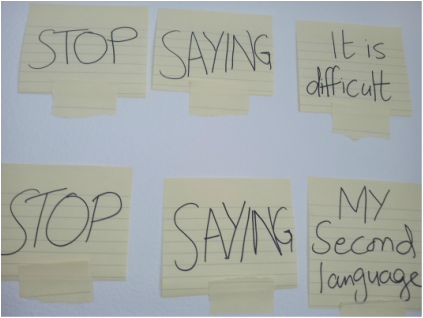My Experience As A TechWomen Mentor
What was the most important thing you learned in the last five weeks? “I learned to depend on myself.” Enas Hamra, TechWomen Fellow
I had the honor this past month to mentor Enas Hamra on behalf of TechWomen--an initiative of the US Department of State’s Bureau of Educational and Cultural Affairs. TechWomen’s mission is to empower, connect, and support the next generation of women leaders in science, technology, engineering and mathematics (STEM) from the Middle East, Africa and Central Asia through mentorship and exchange.
Through the TechWomen initiative, 98 women working in STEM careers from 19 countries participated in a month long mentorship program in the San Francisco Bay Area. Each emerging leader worked with a mentor from a host company on development goals to strengthen their professional capacity and increase their understanding between networks of professionals.
Enas Hamra came all the way from Gaza, Palestine to participate in the TechWomen program. Enas works as a programmer for the UN Relief Works Agency (UNRWA). In her role at UNRWA, she manages the poverty assessment tool and other programs for the Palestinian refugees. Enas’ professional goals for the TechWomen program included improving her communication and public speaking skills and increasing her exposure to programming languages using new .net technologies. Enas has a passion for public speaking and aspires to do her very own TED talk. She also wants to pursue her PhD in computer science.
As Enas’ mentor, I was able to witness all of the “firsts” that she was exposed to as a result of TechWomen. Living in a region where travel only happens by permission in between check points, it is not easy to move around. This was the first time Enas left the borders of her city. She not only made her first trip to the US, but she also made her first trips to the West Bank and Jerusalem. At each point in her journey, she took a step out of her comfort zone and had to learn to be independent. There were many times she found herself lost but her resilience and determination helped her to persevere.
Enas faces significant adversity in her home country, like rolling power outages for eight hours every day, challenging living conditions in an unstable environment, and cultural and gender barriers that discriminate against woman who work outside of the home. As a result, she adopted some belief systems that hindered her confidence. The phrase “it is too difficult” became one, and this was one I helped her to change.
Since Enas had a development goal to improve her public speaking, I suggested that she join Magnetic Speaking and Townsend Toastmasters during her mentorship. Both of these groups have proven track records in public speaking training. Magnetic Speaking does a phenomenal job incorporating improv and other proven techniques to reduce fears in public speaking.
Enas attended weekly Magnetic Speaking training workshops, participated in Magnetic Speaking’s boot camps, and attended the weekly Townsend Toastmasters Meetings. During a workshop, she admitted that one of her struggles with public speaking was due to English being her second language. For the last year, she poured countless hours into watching TED talks so that she could improve her listening and speaking skills, but she still felt inadequate.
For her first ice breaker speech to the Townsend Toastmasters club, she practiced for several hours in front of the mirror and recorded herself. She also put up post it notes on her wall that read “Stop Saying That It Is Too Difficult” and “Stop Saying It Is My Second Language.”
This was her first step in transforming her belief system. When she delivered her speech to the Toastmasters audience, she received a standing ovation. When I shared the recorded video with Enas, she herself was blown away by her own speech.
echWomen has been a life changing experience for both of us. I learned the meaning of resilience and grit. And Enas learned to believe in herself.

